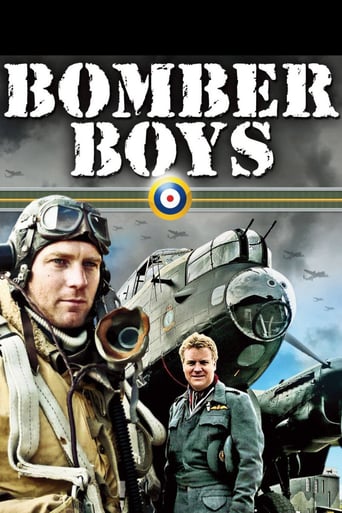

A different way of telling a story
... View MoreA story that's too fascinating to pass by...
... View MoreThe movie turns out to be a little better than the average. Starting from a romantic formula often seen in the cinema, it ends in the most predictable (and somewhat bland) way.
... View MoreStrong acting helps the film overcome an uncertain premise and create characters that hold our attention absolutely.
... View MoreA rather long documentary about two young men, actor Ewan McGregor ("Trainspotting," etc.) and his ex RAF pilot brother Colin, who undertake an investigation of the Lancaster, arguably the best heavy bomber of World War II, while Colin is trained to pilot the only remaining Lancaster in flyable condition.Both the McGregors are affable, clean-cut types and likable. Along the way, they interview modern combat pilots in Iraq, and talk to some of the men who actually flew the Lancaster during the war. The ones we see are still pretty lively. ("Did you have any good luck charms or rituals before a mission?" "Oh, not really. The crew just peed on that wheel over there.") The quest of the brothers is intercut with footage of the Lancasters in action during the war. The airplane was evidently easy to handle. The film doesn't mention it but one test pilot put a Lancaster through a barrel roll. It carried a massive bomb load, about twice that of a B-17 and it had good range.When it was first deployed, in daylight precision bombing, it was a disaster. Like all previous bombers it was shot down in droves. It was armed exclusively with .303 caliber machine guns that didn't penetrate German armor, and it's ventral surface had no armament at all.So, under Sir Arthur ("Bomber") Harris, night missions over German cities were used. Harris' goal was very simple. Flatten all German towns and cities. He was steadfast in his aims and brutal in his methods. When Allied leaders asked him to use the Lancasters in tactical raid in preparation for the D-Day invasions, he demurred. He was intent on flattening cities. I don't want to get into detail but most of the Harris' bombs fell nowhere near their designated targets. Neither did the American bombs.One of the cities he flattened was Dresden towards the end of the war. Dresden was a beautifully preserved and ancient city full of refugees from the Russians. "I'd bomb Dresden again," declared Harris. The film, again not pursuing controversy, doesn't mention it but when the Queen Mum unveiled a statue of Harris after the war, there were boos from the crowd.The film tries to convince us that area bombing was too blunt an instrument to be used today. A British pilot in Iraq tells us that before any bombs are dropped on highly specified targets, there is always a low overflight, "to show them that our dog is bigger than their dog." It's a good idea but I don't know. I can still remember B-52s carpet bombing areas of Vietnam. The technique seems to be good at tearing up cities but not breaking morale. "Unsere Mauern brachen, unsere Herzen nicht!" At any rate, you'll learn from this film about as much as anyone is likely to learn about climbing into a Lancaster, manipulating the turrets, bailing out, and other rather unusual specifics. In its time it was an iconic airplane, as much a part of Britain's war as the adroit and graceful Spitfire.
... View More